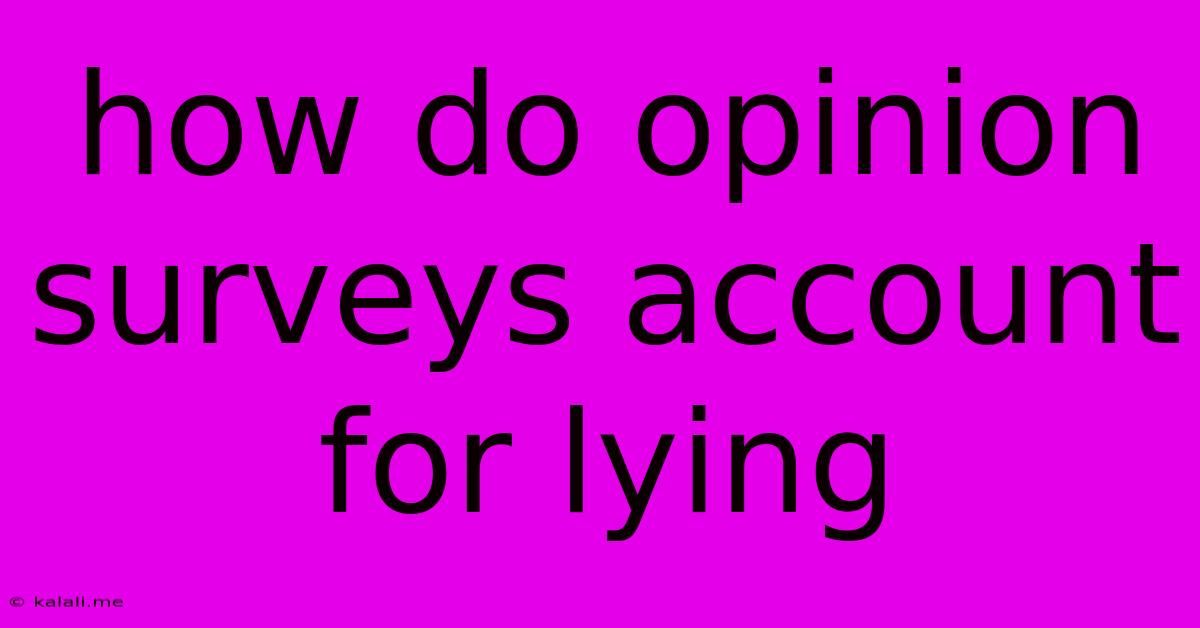How Do Opinion Surveys Account For Lying
Kalali
Jun 04, 2025 · 3 min read

Table of Contents
How Do Opinion Surveys Account for Lying? The Challenges and Strategies of Truth-Seeking
Opinion surveys are cornerstones of market research, political analysis, and social science. They aim to gauge public sentiment, understand preferences, and predict future trends. However, a significant hurdle in achieving accurate results is the pervasive issue of respondent dishonesty – people lying on surveys. This article explores the challenges posed by lying in opinion surveys and the various strategies researchers employ to mitigate its impact.
The Problem of Dishonesty: Why People Lie on Surveys
Several factors contribute to respondents providing inaccurate information. These include:
- Social Desirability Bias: Individuals may answer questions in a way they believe is socially acceptable, even if it's not entirely truthful. This is particularly prevalent when questions touch on sensitive topics like race, religion, or political affiliations.
- Acquiescence Bias: Respondents may tend to agree with statements regardless of their actual beliefs, simply to avoid conflict or appear agreeable.
- Recall Bias: People may have difficulty accurately recalling past behaviors or events, leading to unintentional inaccuracies.
- Strategic Misrepresentation: Respondents might deliberately provide false information to influence the results or protect their privacy. This is more likely in politically charged surveys.
- Demand Characteristics: The way a question is framed or the context of the survey can influence how respondents answer, potentially leading to biased responses.
Strategies to Mitigate Lying in Surveys
Researchers employ various techniques to minimize the impact of dishonesty and improve data accuracy:
1. Survey Design and Question Wording:
- Neutral Questioning: Carefully crafting questions to avoid leading or biased language is crucial. Open-ended questions can sometimes elicit more honest answers than forced-choice questions.
- Randomized Response Techniques: These sophisticated methods introduce an element of randomness that protects respondent anonymity, encouraging more truthful responses on sensitive topics. The researcher can still extract meaningful data from these randomized responses.
- Ensuring Anonymity and Confidentiality: Clearly stating that responses will remain confidential and anonymous can increase honesty, especially for sensitive questions about personal beliefs or behaviors.
2. Data Analysis Techniques:
- Identifying Outliers and Inconsistencies: Statistical analysis can identify responses that deviate significantly from the overall pattern, suggesting potential dishonesty. Inconsistencies between answers to related questions can also be flagged.
- Weighting and Adjustment: Researchers might adjust the weight of certain responses based on demographic characteristics or other factors to correct for known biases in the sample.
- Triangulation: Combining survey data with data from other sources, such as observational studies or administrative records, can help validate survey findings and identify inconsistencies.
3. Choosing the Right Survey Method:
- Selecting Appropriate Sampling Methods: Using a representative sample of the population of interest is essential to ensure the findings are generalizable. Careful attention to sampling methodology reduces the risk of biased results.
- Utilizing Different Survey Modes: Combining online surveys with phone or in-person interviews can provide a more comprehensive understanding of public opinion and potentially uncover discrepancies in responses across different methods.
Conclusion: The Ongoing Pursuit of Accurate Data
While completely eliminating lying in surveys is impossible, researchers continuously develop and refine techniques to minimize its impact. By carefully designing surveys, employing sophisticated analysis methods, and thoughtfully selecting the appropriate survey mode, researchers strive to gather data that is as accurate and reliable as possible. The pursuit of truthful responses remains a vital aspect of ensuring the validity and usefulness of opinion surveys in diverse fields. Understanding the challenges and strategies outlined above is crucial for interpreting survey results critically and appreciating the inherent limitations of this important research tool.
Latest Posts
Latest Posts
-
Can A Bull Snake Kill A Rattlesnake
Jun 06, 2025
-
When I Close Lid Do Nothing Mac
Jun 06, 2025
-
Do You Release The Gas When Shifting Motorcycle
Jun 06, 2025
-
Find The First Five Non Zero Terms Of Power Series Representation
Jun 06, 2025
-
Can You Upload Without A Server
Jun 06, 2025
Related Post
Thank you for visiting our website which covers about How Do Opinion Surveys Account For Lying . We hope the information provided has been useful to you. Feel free to contact us if you have any questions or need further assistance. See you next time and don't miss to bookmark.